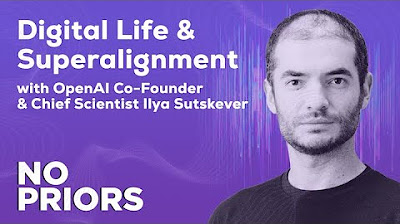Pieter Levels — The Indie Hacker’s Guide to AI Startups
Summary
TLDR在这段对话中,独立创业者Pieter Levels和主持人探讨了独立黑客文化的现状,以及AI初创公司所面临的挑战。Pieter分享了他对于独立黑客运动已死的看法,认为尽管独立黑客文化已经变得主流,竞争更加激烈,但机会仍然存在。他讨论了自己如何通过Twitter建立观众群体,以及在AI领域创业的经历,包括如何处理平台风险和与大型科技公司的竞争。此外,Pieter还提到了他对于远程工作和数字游民生活方式的看法,以及他如何在不断变化的技术和社交媒体环境中适应和创新。整个对话提供了对于独立创业、AI技术发展和社交媒体影响力构建的深刻见解。
Takeaways
- 🌐 独立黑客并未消亡,只是与过去有所不同,现在更加竞争激烈和饱和。
- 💡 AI 初创公司的兴起带来了新的挑战,如缺乏独特性和高成本。
- 🚀 利用现有技术进行创新仍然是可行的,即使在 AI 时代。
- 🛠️ 技术的选择并不比使用它们解决问题更重要,简单和快速的执行往往比使用最佳工具更关键。
- 🔄 创业初期,重要的是快速验证想法,而不是过分关注代码的完美。
- 📈 创业项目的成功往往取决于市场需求和验证,而不仅仅是产品的外观。
- 🌐 社交媒体平台的变化对内容创作者提出了新的挑战,需要适应新的传播方式。
- 🤖 AI 作为工具,可以帮助人们更有效地完成任务,但也可能取代某些工作。
- 🌍 数字游民生活方式依然活跃,但可能逐渐转向在特定季节前往特定地区。
- 💭 社交媒体上的争议性言论可以吸引关注,但也可能导致负面反应。
- 🔄 经济和社会文化周期的变化带来了新的机遇和挑战,重要的是适应和重塑自己。
Q & A
独立黑客(Indie hacking)的概念在Pieter Levels看来已经发生了怎样的变化?
-Pieter Levels认为独立黑客的概念已经从2014年左右开始流行,当时很多人通过Product Hunt这样的平台进行创业。但现在,这个概念已经被大型科技公司所关注,变得主流化,竞争也变得更加激烈。因此,他认为独立黑客不再是一个边缘的、亚文化的事物,而是变成了一种标准的创业方式。
为什么Pieter Levels认为在当前环境下,独立黑客的创业方式变得更加困难?
-Levels指出,现在不仅是独立黑客之间的竞争,还要面对大型科技公司的竞争。这些大公司有资源快速复制独立开发者的创意。此外,随着AI技术的兴起,即使是小规模的独立AI创业公司也需要面对那些已经筹集了数亿美元资金的大型AI创业公司的竞争。
Pieter Levels提到了哪些因素导致了AI创业公司面临的挑战?
-Levels提到了多个因素,包括高成本的GPU服务器、平台依赖性、技术缺乏独占性(如使用相同的AI模型和框架)、以及AI创业公司的高流失率和缺乏防御性。他还提到了经济衰退对融资的影响,以及AI技术发展迅速导致的快速饱和市场。
在讨论中,Levels提到了他如何通过手动工作来验证他的AI创业想法,这是怎样的一个过程?
-Levels描述了他最初是如何手动处理订单的,包括下载客户的照片、使用AI平台进行图像处理,然后将结果照片发送回客户。这个过程非常耗时,但他通过这种方式验证了市场需求,并在一周内实现了流程的自动化。
Levels如何看待社交媒体平台,如Twitter,对于独立黑客和AI创业公司的作用?
-Levels认为Twitter是一个重要的平台,可以用来建立观众群体和社交证明。他提到了自己如何通过Twitter来推广他的产品,并且观察到有机营销和SEO对于初创公司的重要性。他还提到了TikTok作为一个新兴平台,可能对年轻一代的AI创业公司更具吸引力。
在讨论中,Levels提到了他对于AI技术未来的乐观态度,他的理由是什么?
-Levels认为AI技术将带来积极的变化,他强调了AI的益处,并认为应该关注如何利用AI技术使人类未来更好。他还提到了政府应该提供基本收入,以保护人们不受技术发展带来的负面影响。
Levels在讨论中提到了他对于使用老旧技术的看法,他是如何看待技术的Lindy效应的?
-Levels提到了Nassim Taleb的Lindy效应,即技术之所以经得起时间的考验,是因为它老旧且可靠。他认为,尽管新技术可能看起来很吸引人,但它们往往更复杂,而且不够稳定。他倾向于使用那些经过时间考验的技术,因为它们简单、有效且可靠。
Levels在讨论中提到了他对于独立黑客和AI创业公司的看法,那么他对于想要进入这个领域的人有什么建议?
-Levels建议新入行的独立黑客应该尝试使用新技术,并且要快速行动以抓住技术浪潮。他还建议创业者应该寻找市场上未被充分服务的领域,避免与大众随波逐流,并且要准备好长期投入和不断学习。
在讨论中,Levels提到了他对于社交媒体平台变化的适应,他是如何调整自己的策略的?
-Levels观察到Twitter的算法变化使得某些类型的内容更容易获得关注,比如长篇文章和视频。因此,他开始在Twitter上发布更长的文章,以此来适应平台的变化,并保持与观众的互动。
Levels在讨论中提到了他对于AI创业公司的盈利模式和成本控制的看法,他如何看待AI创业公司的盈利前景?
-Levels认为AI创业公司的盈利前景与其能够多快地削减成本有关。他提到了AI创业公司的估值通常很高,但是如果不能有效控制成本,那么高估值就没有意义。他还提到了需要在达到一定盈利水平后考虑出售公司。
Levels在讨论中提到了他对于远程工作和数字游民生活方式的看法,他如何看待这种生活方式的未来?
-Levels认为远程工作和数字游民生活方式将继续存在,但他也提到了这种生活方式可能对个人心理健康的挑战。他预测人们可能会选择在几个固定的地方之间移动,而不是不断地更换地点,特别是当他们有家庭和孩子的时候。
Levels在讨论中提到了他对于社交媒体上争议性话题的处理方式,他是如何应对社交媒体上的批评和争议的?
-Levels认为社交媒体上的争议性话题是一种游戏,他选择保持真实和诚实,即使这可能导致争议。他提到了如何处理社交媒体上的批评,包括不让人们的意见影响自己的真实想法,并从反馈中学习和调整自己的观点。
Outlines

This section is available to paid users only. Please upgrade to access this part.
Upgrade NowMindmap

This section is available to paid users only. Please upgrade to access this part.
Upgrade NowKeywords

This section is available to paid users only. Please upgrade to access this part.
Upgrade NowHighlights

This section is available to paid users only. Please upgrade to access this part.
Upgrade NowTranscripts

This section is available to paid users only. Please upgrade to access this part.
Upgrade NowBrowse More Related Video

Why Joe Budden Says The Music Business Is OVER!

What Is ZIRP And How Did It Poison Startups?

【24卒】三菱UFJリサーチ&コンサルティング(MURC)/Businessセッション《JOB Discovery Online 2022 Autumn》

The Keys to Stripe’s Success | Collison Brothers Podcast #5

Webinar | ¿Cómo aumentar la competitividad a través de la logística en las Pymes?

No Priors Ep. 39 | With OpenAI Co-Founder & Chief Scientist Ilya Sutskever
5.0 / 5 (0 votes)
